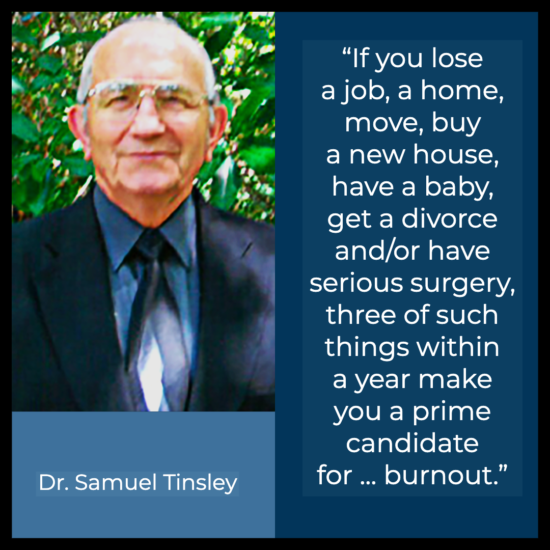

Introduction
Charles Spurgeon, one of the greatest preachers in his time (1834-1892), had a lifetime battle with depression. At times, he was in bed and immobile. H.A. Baldwin, a Free Methodist pastor/author, early 1900s, wrote Holiness and the Human Element. This book addressed such human frailties and infirmities as discouragement, feelings, nerves, fear and worry. Depression, infirmities are not sinful, nor is burnout.
The Condition
Herbert J. Freudenberger, psychoanalyst, invented the term burnout to describe his own experiences. His definition: “A Burnout is someone in a state of fatigue or frustration brought about by devotion to a cause, way of life, or relationship that failed to produce the expected reward.” (Excerpt from Watch Out for Burnout: A Look at its Signs, Prevention and Cure written by Donald E. Demaray p. 13). Summarizing Archibald Hart’s description, burnout is an emotional response. The victim becomes demoralized, begins to lose vision, loses hope, and is in a crushing state of discouragement and also despair. (Pastors at Greater Risk, written by H.B. London, Jr., and Neil B. Wiseman, p. 178).
The Causes
Burnout has many: exhaustion, acute fatigue, stress, depression, indecisiveness, inability to focus, poor relationship with spouse/family, unstructured personal life, self-reliance. (Leading on Empty: Refilling Your Tank and Renewing Your Passion written by Wayne Cordeiro, 2009).
Extraordinary events in life may well trigger burnout. Consider prophet Elijah (James 5:17, 18, 1 Kings 16:33ff). After all the miraculous working of God, he got his eyes off God and on people. Jezebel threatened to kill him. He fled in fear and ultimately collapsed. “Lord, take my life!” I came across this awhile back. If you lose a job, a home, move, buy a new house, have a baby, get a divorce, have serious surgery, three of such things within a year makes you a prime candidate for a nervous breakdown or, I add, burnout.
The Caution Lights
Research reveals the average pastoral ministry life is 5 to 10 years. “90% of pastors may consider leaving the ministry. Pastors most often work more than 46 hours a week.” (Excerpt from Pastors at Greater Risk written by Jack London Jr., and Neil B. Wiseman, p. 22). This may have a negative effect on both pastor and family. Many pastors felt their training was inadequate to meet ministry demands. This causes a pastor to develop poor self-image. The above may lead to warning signs: loss of enthusiasm, feeling alone, hating to answer the phone, focusing on petty things, paying less attention to spouse and family, stress and more difficulty being with people. Bill Mills and Craig Parro noted the outline to burnout includes, “when life seems meaningless,” and “when ministry overwhelms you.” (Excerpt from Finished Well in Life and Ministry: God’s Protection from Burnout, pp. 153, 173).
The Conquerer
“In all these things we are more than conquerors through Him that ‘Loves’ us” (Romans 8:37). These principles in a pastor’s life will insure you against burnout.
Keep Healthy
- Physically – A proper diet and exercise are essential. Your body is the temple of the Holy Spirit.
- Mentally – Positive attitudes and wholesome thoughts must characterize your mind. “Whatever is … think on these things!” (Philippians 4:8). Meditate on the Word of God (Psalm 1).
- Spiritually – “Rejoice ever more. Pray without ceasing. In everything give thanks for this is the will of God in Christ Jesus concerning you” (1 Thessalonians 5:16-18). John Wesley describes this as Christian Perfection. He also declared that “I have so much to do that I spend several hours in prayer before I am able to do it.”
A strong marriage and supportive spouse are irreplaceable. Late Bishop Dale Cryderman advised placing on the calendar your date with your spouse. You have an appointment. Keep it!
Proper rest is essential. This not only means sleep. Jesus told his busy disciples, “come apart and rest for a while” (Mark 6:31). If you do not find a place to come apart periodically you will ‘come apart’. Best of all, wherever you are “there remains a rest for the people of God” Hebrews 4:9).
Delegate wisely. Develop leaders by modeling and training them.
Seize your time. “Unseized time flows toward my weaknesses” (Ordering Your Private World, written by Gordon MacDonald, p. 74). Do not surrender to the tyranny of the urgent. Follow the 80-20 rule. Spend only 20% of your available time with negative, complaining people or circumstances. Spend 80% of your time developing willing disciples/leaders.
The Cure
If you are already experiencing burnout … recovery is possible!
Intentionally review every principle of the previous segment, “The Conqueror,” and immediately begin perusing them.
Determine the answer to these questions. Write the answers down.
- What is your true assessment of your present condition?
- What have been the anchors in your life?
- What are the top priorities of your life?
- What awareness do you have of the power of the Holy Spirit in your life? Francis Chan, in Forgotten God: Reversing Our Tragic Neglect of the Holy Spirit, decries the tragic neglected of the Holy Spirit (p. 15).
- Exercise utter dependence on the Holy Spirt filling and empowering you (Acts 1;8).
- Limit television and technology usage.
- Develop margin. “Marginless is not having the time to read the book you’re reading on stress; margin is having time to read it twice.” (Excerpt from Margin: Restoring Emotional, Physical, Financial, and Time Reserves to Overloaded Lives, written by Richard A. Swenson, MD., p. 13). He writes on restoring calm and sanity to your life.
- Exercise faith for God’s will and total provision in your life.
Three major sources to assist recovery will likely include a Christian counselor, focused prayer support by a support group, and a medical doctor’s assessment to determine if medication is needed.
Continued Recovery
- Find a trustworthy accountability partner.
- Mentor freely: superiors, peers, juniors.
- Review your call to ministry and remember Esther 4:14c.
- Continue to renew that love for your ministry.
- Redevelop a healthy self-image and rid yourself of any victimization.
- Learn to grow in adversity, Philippians 4:11b.
- Keep a sense of humor. God laughs and so can you!
- Be alert to any signs of reversal.
- Improve your ministry skills.
- Ever practice personal holiness.
- Always, in every situation, circumstance, remember that people matter to God, therefore they must truly matter to you. Our motto is, “Love God, Love People, Make Disciples.” Amen.
About the Author
Samuel H. Tinsley was born on November 21, 1940, to James Edward and Virginia Louise Tinsley, in Warren County, Bowling, Kentucky on a tenant farm. James Edward was a Free Methodist pastor and church planter in the Kentucky-Tennessee Conference. Samuel H. Tinsley married Lillian, daughter of Elmer and Alverta Reagle, Free Methodist pastor in the Keystone Conference.
Dr. Tinsley graduated from Oakdale Christian Academy, attended Kentucky Mountain Bible College for one year; attended Trevecca Nazarene College for one year; graduated WKU with a B.A. and M.A.; graduated from Asbury Theological Seminary with a M. DIV.; graduated Union Theological Seminary with a D. Min.
His work experience includes teaching public school from K-12. He is presently teaching Theology by extension for those pursuing ordination. He has served in five different conferences of the Free Methodist Church. He has also served on the denominational Board of Administration for a total of 10 years. He has pastored for 22 years and was a Superintendent in the Louisiana, Pittsburgh and North Michigan Conferences for a total of 23 years. He is now retired in the Gulf Coast Conference (formerly the Louisiana Conference), serving as a district leader.
